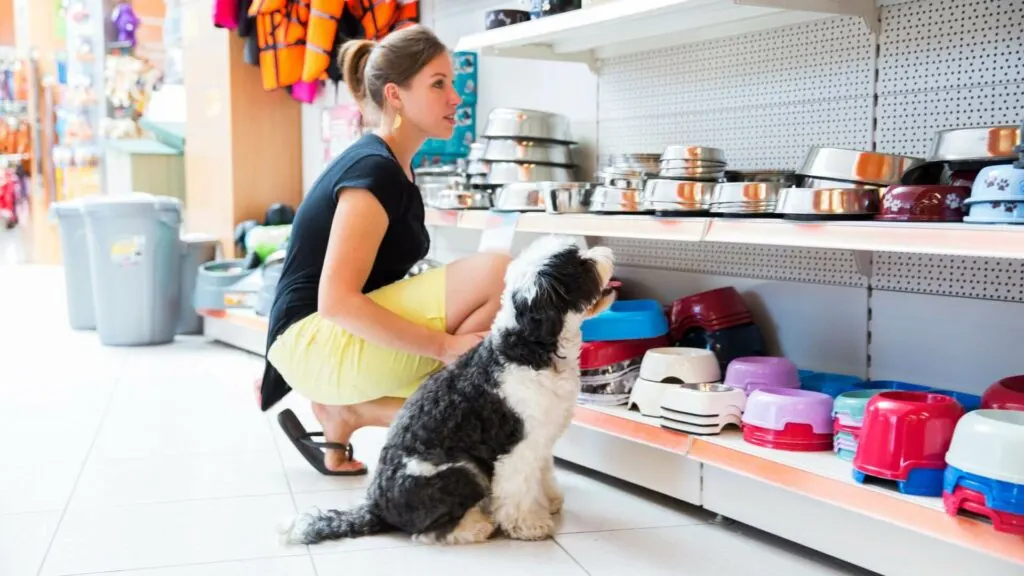Puppies are adorable. They have big eyes, rounded faces, soft fur, floppy ears, and button noses. These fluffy little creatures are perfect for cuddling on the couch, so there is no reason not to bring home one.
Welcoming a puppy is exciting, but looking after it is hard work. Owning a pup comes with significant responsibilities, many of which first-time pet parents overlook. However, getting informed of those responsibilities can help avoid pitfalls.
In this guide, we’ll discuss a few common mistakes pet parents make after bringing home a puppy so that you don’t.

#1 Not Starting Crate Training Early Enough
Delaying crate training is one of the biggest mistakes pet parents make. Dog cages or indoor kennels are sometimes referred to as crates. These limit a pup’s access to the house until it is house-trained. Crates also offer pooches a safe and secure place to go for short periods of time.
Some pet parents hesitate to crate-train their pups. Delaying crate training can lead to behavioral issues, aggression, and separation anxiety in dogs.
Whether your pup is eight weeks old or two months old, start crate training it. Buy a large crate for your pup to stand up, lie down, and turn around comfortably. Make it comfortable by placing dog blankets. Keep the door open at all times. Some dogs explore the crate at leisure and even start sleeping in it immediately.
But if it doesn’t explore itself, you must introduce the crate to it. Putting small treats or your pup’s favorite toys near or inside the crate might entice it to explore it. Once your pup gets inside the crate, use positive reinforcement to encourage it to stay there. Offer them treats or feed them near the crate.
Never should you use the crate as punishment. Your pup will associate it with negativity and refrain from going into it. Always use it as a positive space.
#2 Picking a Food Based on Marketing

What you see on dog food labels is nothing but marketing. Terms like “organic,” “natural,” and “fresh” on dog foods often persuade pet parents to buy them. One thing they fail to understand is that these are buzzwords slapped on the dog food packaging to lure dog owners.
Not every dog food is created equal. Thus, you mustn’t buy food for your pup based on marketing. Products with great marketing are often substandard, whereas those marketed poorly are of excellent quality.
Before you buy any food, do your own research. Always choose high-quality food designed to meet your pup’s nutritional needs. Some pups are allergic to chicken, beef, eggs, wheat, dairy, soy, and lamb. Corn and nuts can also trigger allergies in canines.
Go through the ingredients list carefully. It will help you determine if the food contains any potential allergens that could trigger allergic reactions in your puppy.
Whether your pup is diagnosed with a food allergy, feed it prescription diet foods. Hill’s Derm Complete puppy food is a great option.
This nutrition-formulated food that helps prevent adverse food reactions results from a collaboration between veterinarians and dedicated Hill’s nutritionists. Hill’s Derm Complete puppy food is formulated with rice protein concentrate, Vitamin E supplement, niacin supplement, hydrolyzed chicken flavor, and folic acid for food and environmental sensitivities.
PetCareRx explains that this nutritionally rich formula helps strengthen the skin barrier, promotes overall health, and addresses common issues such as scratching, licking, and skin redness.
Fish oil, riboflavin supplement, brown rice, Vitamin C, coconut oil, and dried beet pulp are other ingredients used in this dry dog food. Hill’s Prescription Diet Derm Complete Puppy Environmental/Food Sensitivities Dry Dog Food has an irresistible taste, so your pup will relish it.
Though the package contains complete feeding instructions, ask your vet to be on the safe side.
#3 Too Much Training, Too Little Playtime

Whether you’ve brought home Dachshund, Labrador, or Goldendoodle Puppies, it’s important not to overwhelm them with too much training without allowing enough time for play and rest. Overtraining can lead to burnout and frustration, especially when the puppy doesn’t fully understand what’s being asked of them.
Since puppies have shorter attention spans than adult dogs, training sessions should be kept brief but frequent. Experts recommend multiple short sessions throughout the day, as puppies learn more effectively this way. A single 20- to 30-minute session is often too long and can lead to mental fatigue. Instead, aim for five- to ten-minute sessions several times a day.
The same rule of thumb applies to playtime. Follow the five-to-ten-minute guideline, broken up into three to six short sessions daily. Make sure to engage your puppy when they are fully awake and energetic for the best experience.
#4 Skipping Flea, Tick, and Heartworm Prevention
Ticks, fleas, and heartworms are dangerous for dogs. These parasites expose canines to a host of health issues.
Ticks transmit harmful bacteria to dogs’ bloodstreams and tick-borne infections such as Lyme disease and Rocky Mountain Spotted Fever. Fleas can cause allergies or, even worse, anemia in dogs. Heartworms result in heart failure, severe lung disease, other organ damage, and even death. That is why parasite prevention is essential for pups.
Many preventatives treat a broad spectrum of parasites, whereas others focus on a single group. Trifexis, for instance, prevents not only fleas and heartworms but also intestinal parasites. Another medication, Credelio, helps prevent ticks and fleas.
Do not start any parasite prevention on your own, however. Always consult a veterinarian regarding parasite prevention, for they will be able to guide you the best in this regard.
4 Mistakes to Avoid When Bringing Home a Puppy
Wrapping it up and bringing home a puppy is rewarding, but the first few months could be fraught with challenges. Taking a proactive approach to care for your puppy from the get-go will help you avoid these mistakes.
Many pet owners overlook their puppy’s dental health. But you mustn’t do so. Supply your puppy with plenty of chew toys so it doesn’t bite you or chew other items in your home. Also, make sure to schedule a pet visit as soon as you bring home a puppy for vaccinations and to ensure it is healthy.

Jessi is the creative mind behind The Coffee Mom, a popular blog that combines parenting advice, travel tips, and a love for all things Disney. As a trusted Disney influencer and passionate storyteller, Jessi’s authentic insights and relatable content resonate with readers worldwide.
